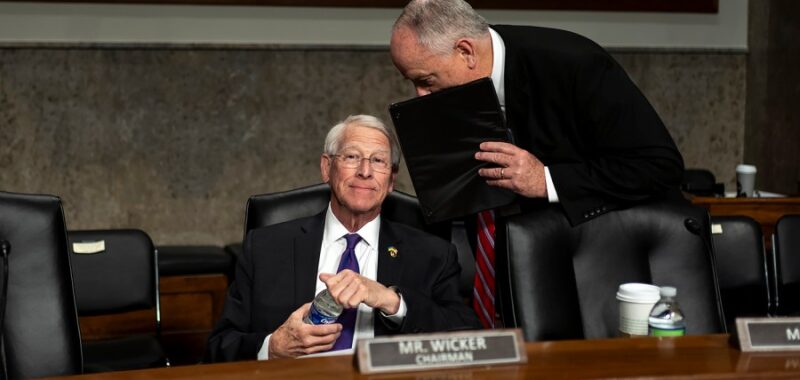
Senate Armed Services Committee Chair Roger Wicker (R-Miss.) knocked President Trump’s 2026 budget proposal on Friday for not doing enough to keep pace with military threats from China, Russia and other adversaries.
Wicker warned the spending level called by the White House budget would “decrease President Trump’s military options and his negotiating leverage.”
“President Trump successfully campaigned on a Peace Through Strength agenda, but his advisers at the Office of Management and Budget were apparently not listening. For the defense budget, OMB has requested a fifth year straight of Biden Administration funding, leaving military spending flat, which is a cut in real terms,” Wicker said in a statement.
Office of Management and Budget Director Russ Vought wrote in a letter to Senate Appropriations Committee Chair Susan Collins (R-Maine) that Trump’s budget would increase defense spending by 13 percent for fiscal year 2026, bringing it to $1.01 trillion.
But a Senate GOP aide said that the White House budget office has requested $893 billion in baseline defense spending for next year through the annual appropriations process and is padding that number with funding that administration officials hope to include in the budget reconciliation bill that will include tax cuts and other priorities.
The aide noted that appropriated budget for defense in fiscal year 2025 was $893 billion and the White House proposal for defense discretionary sending in fiscal year 2026 is $893, not counting whatever money may come from the separate reconciliation process.
Wicker and other Senate defense hawks have repeatedly said the $150 billion in new defense spending they plan to include in the budget reconciliation bill should be a supplement to regular defense spending, which they argue should grow on an annual basis to meet national security needs.
“I have said for months that reconciliation defense spending does not replace the need for real growth in the military’s base budget,” Wicker said Friday.
Wicker and defense hawks on Capitol Hill envision the defense money in the reconciliation bill going to new defense priorities, such as Trump’s Golden Dome missile defense project, and not to make up for shortfalls in annual budgeting.
And the $150 billion in direct defense spending that is slated to be included in the budget reconciliation bill is expected to last over the next four years.
The White House budget proposal would pull $119 billion from the defense spending in the reconciliation bill to account for what it describes as a $1 trillion defense budget for next year, according to the Senate source.
“The Big, Beautiful Reconciliation Bill was always meant to change fundamentally the direction of the Pentagon on programs like Golden Dome, border support, and unmanned capabilities – not to paper over OMB’s intent to shred to the bone our military capabilities and our support to service members,” Wicker said in a statement, referring to the White House plan to lean on the budget reconciliation package to plus up defense spending for fiscal year 2026.
Wicker in his statement said the White House “is not requesting a trillion-dollar budget.”
“It is requesting a budget of $892.6 billion, which is a cut in real terms,” he said. “This budget would decrease President Trump’s military options and his negotiating leverage.”
“We face an Axis of Aggressors led by the Chinese Communist Party, who have already started a trade war rather than negotiate in good faith,” he added. “We need a real Peace Through Strength agenda to ensure Xi Jinping does not launch a military war against us in Asia, beyond his existing military support to the Russians, the Iranians, Hamas, and the Houthis.”
Vought in a briefing call with reporters Friday argued that the White House budget provides a “more durable way to get to a trillion dollars in defense spending.”
He called the proposed 13 percent increase in defense spending for next year, which includes the supplemental funding Republicans hope to attach to the reconciliation bill to extend the 2017 tax rates and secure the U.S.-Mexico border, as a “very healthy increase.”
“We want to make sure that it is going towards capabilities that DoD needs, says it wants, says are vital,” Vought said. “And we are changing the way that this place works, and we’re happy to continue to explain that to the Hill. And I’m not surprised that we’ll have to do some work on that front.”
Alex Gangitano contributed.

